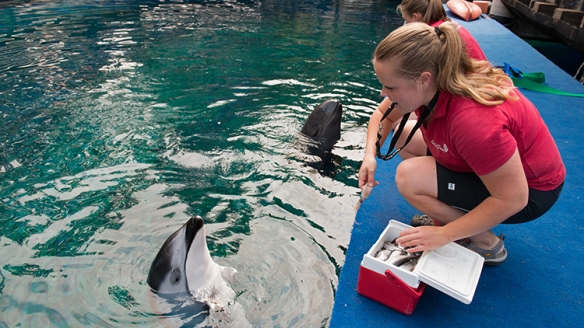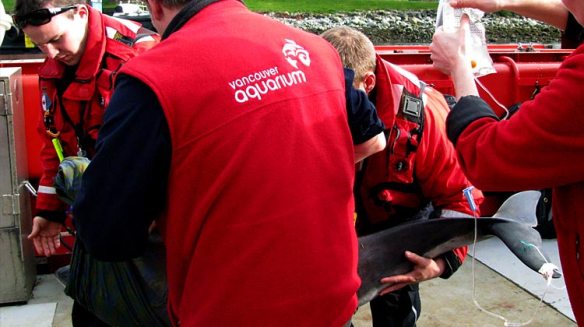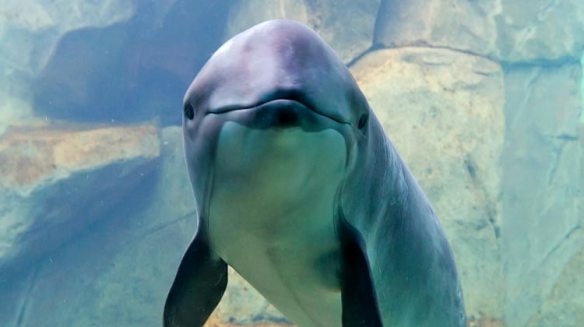Two days ago, on March 9th, the Vancouver Aquarium’s role in conservation, rescue and rehabilitation, and research was forever altered after the Vancouver City Park’s board voted to prohibit the housing of cetacean species, which includes all whales, dolphins, and porpoises.
The Association of Zoos and Aquariums called the decision “troubling”. And, in a politically correct world they’re right. But, let’s not be politically correct for a second. Let’s be blunt. Let’s call a spade a spade. Let’s call this ultimatum what it really is: irresponsible.
The Vancouver Aquarium has been a major contributor to cetacean research and conservation for the last fifty years. Notable projects include data collection of killer whale vocalizations, the metabolic rates of pacific white-sided dolphins, communication patterns between beluga mothers and offspring, echolocation abilities of multiple species, and the rescue and rehabilitation of several whales, dolphins, and porpoises, three of which still call the Vancouver Aquarium home.
Currently, the Aquarium houses only three cetaceans, Helen (Pacific white-sided dolphin), Chester (false killer whale), and Daisy (harbor porpoise). ALL of which were RESCUED.

Helen (foreground) and Chester interacting with members of their care team. (Image from vanaqua.org)
So, let’s walk through this step by step with Daisy as an example. Stranded for unknown reasons in 2008, Daisy was rescued as a one-month old calf suffering from severe dehydration, emaciation, and muscle loss. At first, she was so weak and malnourished, she did not have the ability to hold herself up in the water, let alone swim. After nearly a year of rehabilitation, during which time the Vancouver Aquarium’s animal care staff members gave her the best possible support through their knowledge and expertise, Daisy beat epically long odds and thrived. Deemed non-releasable due to the fact that she never learned to hunt and survive in the wild, the Vancouver Aquarium became her permanent home in 2009.
In the years that she’s lived at the Vancouver Aquarium since, Daisy’s story has touched hundreds of thousands of people. She’s helped educate the public about her species through presentations called “Porpoise Talks”, connected and interacted with guests as she displays her curious side, and participated in research studies that have helped reveal details about porpoises that are assisting researchers and conservationists in saving multiple cetacean species today.
Her journey also mattered when Levi, an adult male harbor porpoise stranded several years later in March of 2013. In the same way Daisy was not able to support herself in the water, neither was Levi, and in similar fashion to the previous situation, the experts at the Aquarium fashioned a custom-made raft and cared for him during his several months of rehabilitation. As he improved, Levi became a candidate for return to the wild. And, in September of 2013, six months after he was found stranded on the shore of Saanich Inlet, Levi was swimming in the ocean again.
But with the foolish decision made just two days ago, successful stories like Levi’s and Daisy’s, stories of survival and scientific progress, will become few and far between, if not completely nonexistent.
What happens next time? When an animal flounders, in need of help, who will be there to assist? Where will that animal go? Without the Vancouver Aquarium, which is one of Canada’s only teams with the expertise and availability to save stranded cetaceans, the next time a porpoise, dolphin, or whale strands, that injured/ill animal will have to be transported several hours to the next rehabilitation center *IF* there is one available. And let’s hope there is, because the only other option is for the animal to be euthanized by drug or bolt gun.
There are repercussions for the actions set forth by this reckless decision. This vote, made for political reasons alone, in hopes to appease the, admittedly loud, but small, unqualified minority, is a setback in the scientific study of cetaceans and also jeopardizes the lives of future animals in distress.
Yet, while I am angry and distressed by those consequences, as all cetacean-lovers should be, I am not surprised that the board caved to aforementioned uninformed protestors.
We live in a blind society that values unscientific, short-sighted philosophies more than the wellbeing of individual animals and entire species.
We live in a society where documentary filmmakers attempt to damage and dismantle reputable zoological facilities with lies and twisted information without considering what that means for future distressed and stranded animals.
A society where the same soccer mom who condemns and vows to boycott world-renowned aquariums on Twitter also hypocritically demands “rescue the dolphin!”, not understanding how the same professional entities they choose to attack are needed in order to give that animal a future of any kind.
A society where PETA finds the money to brandish billboards with crass images and grossly tactless misinformation to slander the zoological community’s hard-working, well-educated animal care specialists who have dedicated their lives to reviving individual animals and researching whole species, and yet donates NOT A SINGLE DIME to cetacean rescue, research, or conservation.
Meanwhile, accredited organizations like the Vancouver Aquarium, are actively participating in research and conservation that directly benefits killer whales, belugas, harbor porpoises, and the most endangered marine mammal in the world: the vaquita.
In fact, some of the acoustic research conducted by researchers at the Vancouver Aquarium with the help of Daisy, is currently being used to help locate the remaining thirty individuals of the elusive vaquita species in hopes of bolstering the population and bringing them back from the very edge of extinction.

Vancouver Aquarium’s rescue team at work. (Image from vanaqua.org)
Whales, dolphins, and porpoises are intriguing, charismatic animals, and as such, have garnered adoration and attention from many. Shutting down reputable zoos and aquariums, organizations that help research, conserve, and rescue animals is not helpful.
It’s harmful.
However, it is admirable to want to make a difference. Zoos and aquariums encourage and need your help, because when animals and species are in need, very rarely do the loudmouthed armchair-activists actually show up.
So, help.
Save the dolphins. Recycle discarded fishing line. Choose reusable bags instead of plastic when you go to the grocery store. Volunteer as part of a marine mammal rescue team.
Save the porpoises. Donate to VaquitaCPR. Refuse to participate in balloon releases. Organize a beach cleanup.
Save the whales. Eat sustainable seafood when you’re ordering fish at a restaurant. Visit a responsible zoo or aquarium involved in rescue, research, and conservation programs. And then, teach others how to care for them too.
We all have the power to make a difference for these animals, but it should be the right kind of difference. It should be one based on science. It should be one based on correct, factual information. It should be a responsible one full of action that benefits them now and in the future.
So, for the love of cetaceans, choose to make the right difference and pass it on.

Daisy. (Image from vanaqua.org)
[Correction: This post originally identified the Vancouver Aquarium’s board as the entity that voted on the prohibition of cetaceans. This is incorrect as the decision was, in fact, made by the Vancouver City Park board which controls the property currently leased by the accredited aquarium and this post has been changed to reflect that fact.]


The Vancouver Aquarium Board did
NOT make this decision- it was the
Vancouver Parks Board!!!! Big difference. The aquarium fought very hard against this decision. Please correct your story.
You are right. Thank you for pointing out this mistake. I hold the staff of the Vancouver Aquarium in very high respect and apologize for my incorrect statement. This post has been changed to properly reflect the situation.
In your opening paragraph you state it was the Vancouver Aquarium’s board who made the decision. However, it was the Vancouver City Park’s board, whom which the Vancouver Aquarium leases property from, that made the decision – by amending their bylaws to prohibit the display of cetaceans.
I’m sure the Vancouver Aquarium’s board is still very content with housing cetaceans for education and research. ☺️
Thank you for pointing out this mistake. The post has been edited to reflect this fact.
This is very sad, in the UK we do not have cetacean rehab facilities so unfortunately if we can not refloat them then it is a case of euthanasia. It would be amazing to have such facilities available as there are cases that just need rehab and care for a while before they could be released back.
Nowhere apart from aquariums have the (economical) ability to have spare pools ready for rescue animals with the correct filtration/water management and the staff expertise to ensure that it is right. If other aquariums follow suit this will be a disaster as all the main rehab teams that I am aware of on continential Europe are also within aquariums.
This is a knee-jerk decision based on keeping killer whales and large dolphins that were captured in the wild and housed in inadequate confines.
A rehabilitation facility is sorely needed for the small cetaceans mentioned in this article. It’s like asking bald eagle rehabilitation facilities to stop helping them if they can’t fly.
The community should be up in arms about this ill-advised decision.
Please reconsider your decision for the sake of these beautiful animals.
A very poorly thought out, political wrong decision, shame on you Parks Board you have to go!